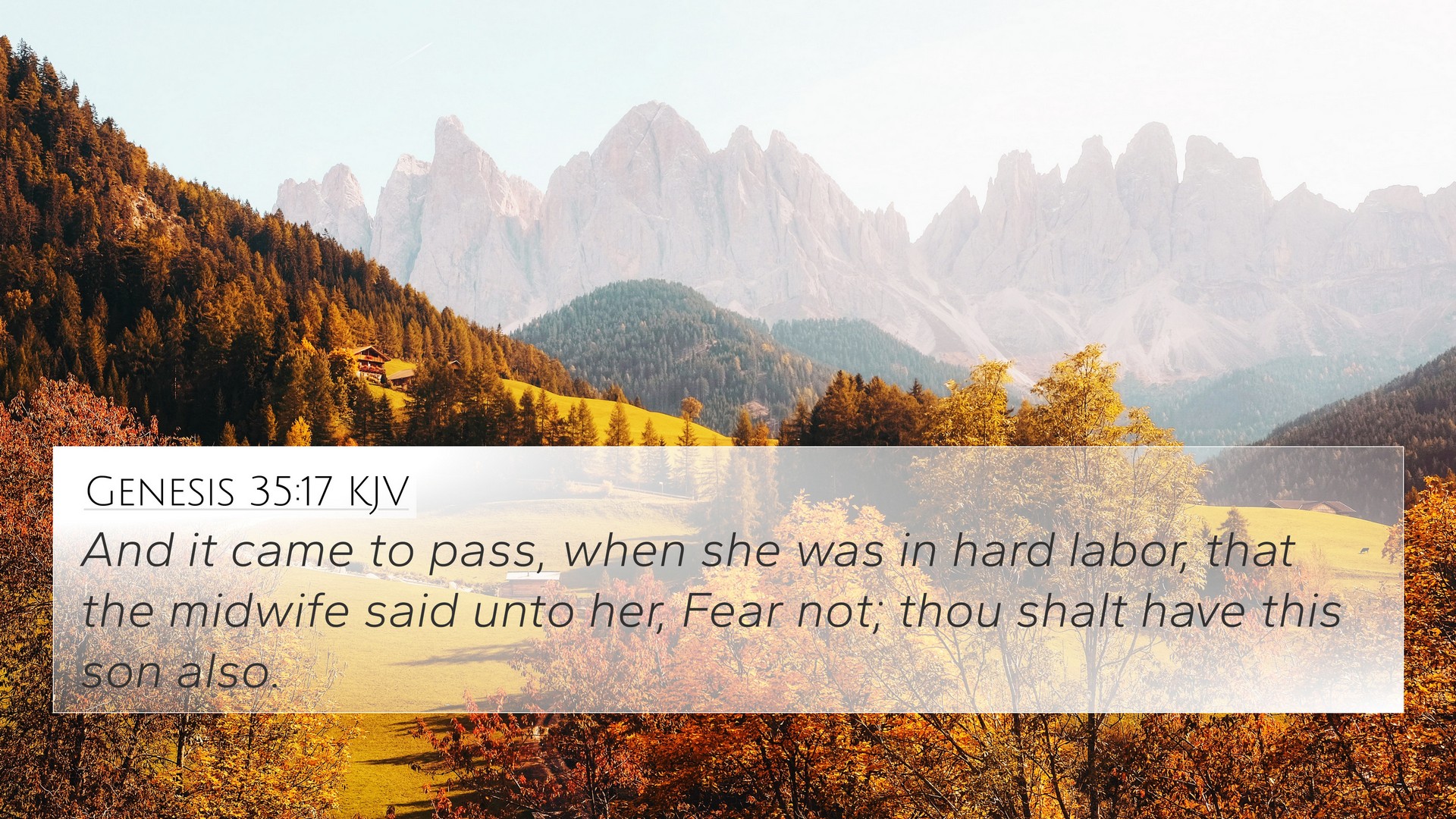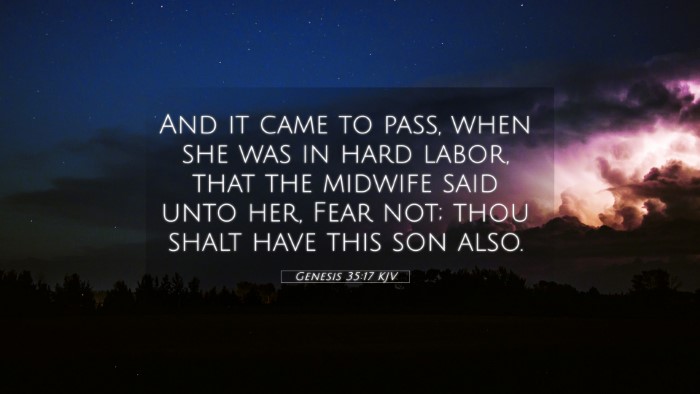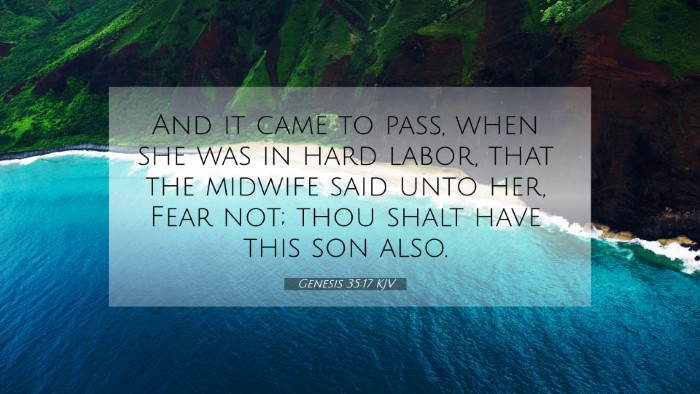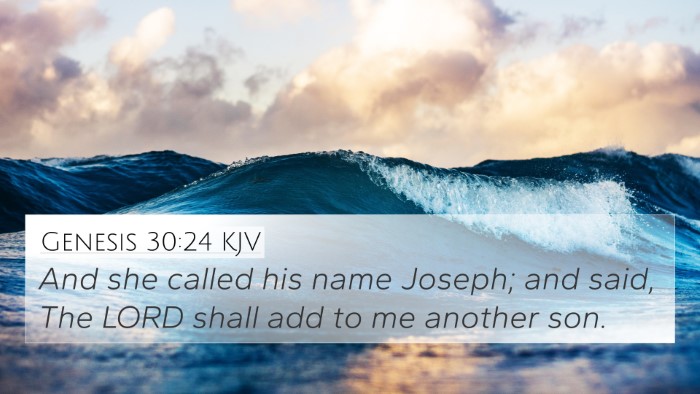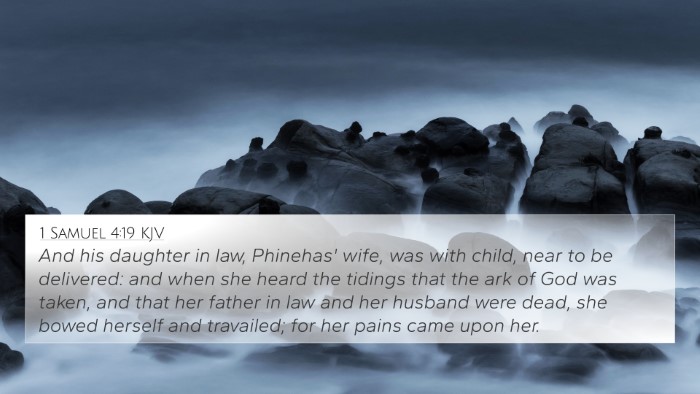Understanding Genesis 35:17
Genesis 35:17 reads: "And it came to pass, when she was in hard labor, that the midwife said unto her, Fear not; thou shalt have this son also."
This verse occurs during the birth of Benjamin, Jacob's youngest son, and is significant as it provides insights into both the trials of childbirth and the divine assurance given to Rachel. The commentary interpretations elucidate various themes and connections with other biblical texts.
Verse Context
In the broader narrative of Genesis 35, we witness the journey of Jacob back to Bethel where God commanded him to return. This chapter encompasses themes of renewal, redemption, and the fulfillment of God’s promises. Rachel's difficult childbirth not only signifies personal pain but also has deep implications in the lineage of Israel.
Commentary Insights
Matt Henry's Commentary
Matthew Henry emphasizes the anxiety incurred during childbirth but highlights the midwife's comforting words as an instance of God’s providential care. This episode reflects God's encouragement in times of distress and the reassurance of life over death.
Albert Barnes' Commentary
Albert Barnes notes that the phrase "Fear not" serves both as a reassurance for Rachel in her moment of travail and as a broader theme throughout scripture where God’s presence alleviates fear. Barnes connects this to the concept of maternal dedication and the role of women in the biblical narrative.
Adam Clarke's Commentary
Adam Clarke discusses the midwife's role as a significant figure in assisting Rachel, acknowledging the medical aspects of childbirth while also emphasizing the spiritual significance associated with the birth of Benjamin. Clarke elaborates on the importance of names and their meanings within the text, considering Benjamin’s name which signifies “son of my right hand.”
Thematic Connections
- Divine Intervention: The reassurance provided by the midwife correlates with Luke 1:13, where the angel comforts Zechariah, demonstrating God's ongoing presence in critical moments.
- Fear and Comfort: The theme of fear addressed in Genesis 35:17 is echoed in Isaiah 41:10, where God assures His people that they need not fear because He is with them.
- Motherhood and Strength: This verse can be linked with Proverbs 31:25, depicting women who are clothed in strength and dignity, reinforcing the valor shown by Rachel during her childbirth.
- Promise of Life: Similar to John 10:10, where Jesus speaks of giving life abundantly, here we observe the promise of a new life amidst labor pains.
- God's Faithfulness: The assurance given to Rachel is reminiscent of Deuteronomy 31:6, where believers are reminded that God will never leave them nor forsake them.
- Heritage and Legacy: The significance of Benjamin as part of Israel's tribe parallels with Romans 9:3-5, illustrating how the lineage of Israel is preserved through such births.
- Women’s Role in Salvation History: The challenges faced by mothers like Rachel offer a backdrop to the larger narrative of women shaping biblical history, similar to Elizabeth in Luke 1:57-58.
Cross-References for Deeper Study
- Genesis 30:22-24 - The birth of Joseph and the heartache of Rachel.
- Genesis 48:1-2 - Jacob blessing his sons, further highlighting the legacy of Benjamin.
- Exodus 1:15-16 - The role of Hebrew midwives reflecting God's protection.
- Jeremiah 31:15 - Rachel weeping for her children, connecting Rachel's trials with future lamentations.
- Matthew 1:2-3 - The genealogy of Jesus, which includes Judah and Benjamin.
- Luke 2:7 - The circumstances surrounding another birth, echoing the theme of humble beginnings.
- Romans 11:1 - Examining God's faithfulness to Israel, where the history of births like Benjamin is critical.
Conclusion
Genesis 35:17 serves as a rich icon of maternal resilience, divine providence, and the complexities surrounding childbirth. Through cross-referencing biblical texts, one can uncover a deeper understanding of both the individual narrative and its connection to the larger biblical themes. This verse, in its context and through various interpretations, illuminates the perpetual dialogue within Scripture about fear, faith, and the fulfillment of God's promises across generations.
Exploring Further
For those seeking to engage in cross-referencing Bible study, tools like Bible concordances and reference materials can enhance one’s understanding of connections and themes throughout the texts. By exploring these connections, believers gain insights into the rich tapestry of God’s plan as told through narrative, poetry, and prophecy.
